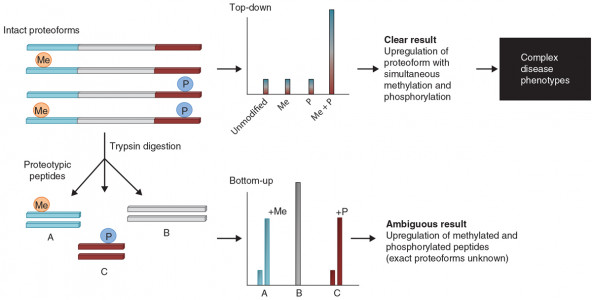Quantitative Translational Top-Down Proteomics
The main goals of using proteomics in translational research include detecting disease in the early stages, predicting disease prognosis and identifying druggable targets for new therapeutics. Diagnostic or companion diagnostic biomarkers are greatly sought after. The holy grail of biomarker discovery, however, is proteomic biomarkers that predict that a given phenotype will develop.
Great progress has been made toward these goals over the past 20 years, and proteomics has been a powerful tool for providing information about a broad range of diseases and clinical phenotypes. However, compared with the discoveries that rapidly followed completion of the Human Genome Project, the translation of proteomic information into medical advances has been slower than expected. A plethora of biological information has been obtained, yet the data have minimal clinical relevance.
This type of discovery-based protein analysis has, therefore, been associated with a high cost and a low return on investment. Despite the modest use of proteomics within clinical applications, many in the field are optimistic that proteomics, which is still evolving, will play an important part in 21st century medicine.
Related Publications
Savaryn JP, Catherman AD, Thomas PM, Abecassis MM, Kelleher NL “The emergence of top-down proteomics in clinical research.” Genome Med, 2013, 5(6) p. 53.
Summary | Full Text (PMC) | Full Text (DOI)
Zhang J, Roth MJ, Chang AN, Plymire DA, Corbett JR, Greenberg BM, Patrie SM “Top-down mass spectrometry on tissue extracts and biofluids with isoelectric focusing and superficially porous silica liquid chromatography.” Anal Chem, 2013, 85(21) p. 10377-84.
Zhang J, Guy MJ, Norman HS, Chen YC, Xu Q, Dong X, Guner H, Wang S, Kohmoto T, Young KH, Moss RL, Ge Y “Top-down quantitative proteomics identified phosphorylation of cardiac troponin I as a candidate biomarker for chronic heart failure.” J Proteome Res, 2011, 10(9) p. 4054-65.
Summary | Full Text (PMC) | Full Text (DOI)
Pricing
https://proteomics.northwestern.edu/services/rates/
Instruments Used
Orbitrap Elite


